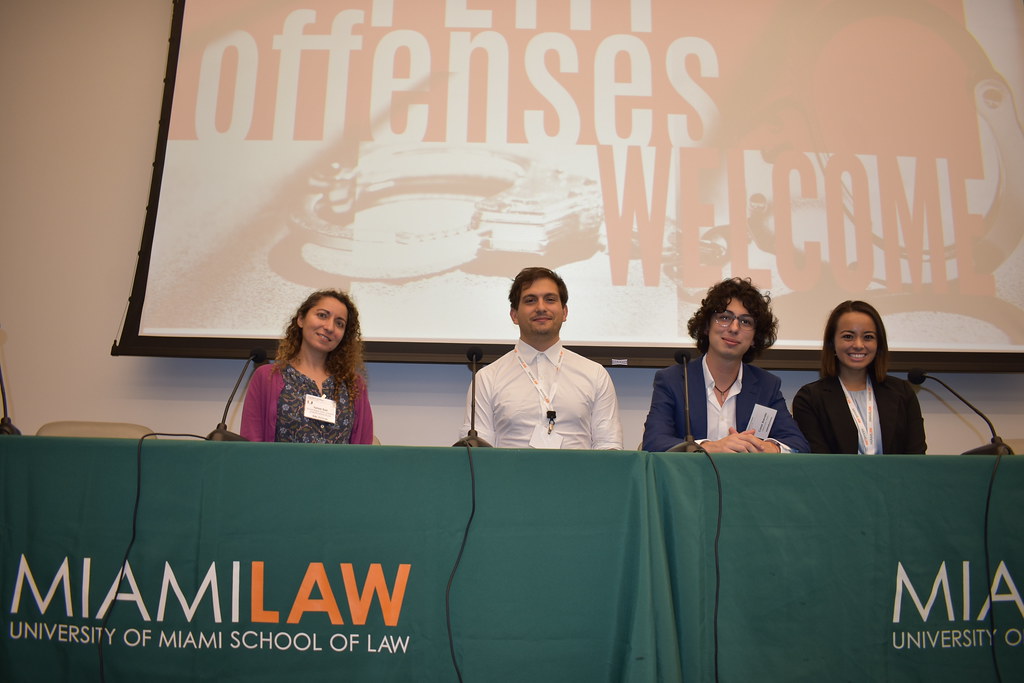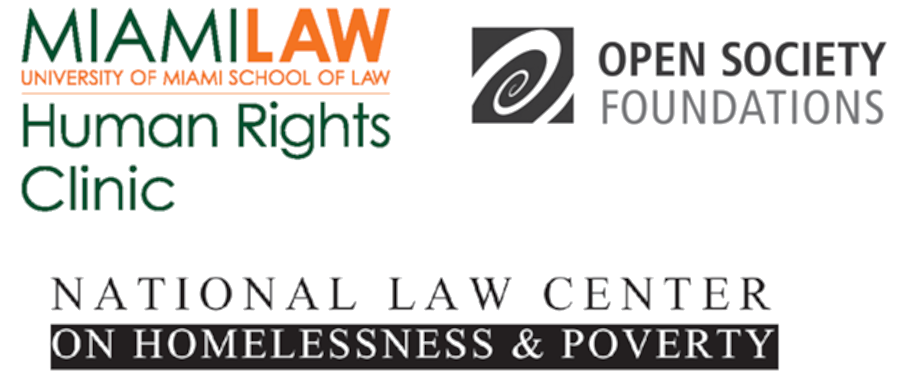View the agenda.
To view individual video sessions, please click on the links below.
Friday, September 20, 2019
2:00 p.m. - WATCH: Welcome Remarks
- Anthony E. Varona, Dean and M. Minnette Massey Professor of Law, University of Miami School of Law
- Caroline Bettinger-López, Professor of Clinical Legal Education and Director, Human Rights Clinic, University of Miami School of Law
- Eric Tars, Legal Director, National Law Center on Homelessness & Poverty
- Louise Ehlers, Programme Manager, Human Rights Initiative, Open Society Foundations (OSF)
2:40 p.m. - Video: How One Man Defeated the Legacy of an Empire
2:45 p.m. - Opening Session
- WATCH: Symposium Overview: Tamar Ezer, Associate Director and Lecturer in Law, Human Rights Clinic, University of Miami School of Law
- WATCH: Opening Address: Leilani Farha, UN Special Rapporteur on the Right to Housing; Executive Director, Canada without Poverty & Julieta Perucca, Senior Aide to the UN Special Rapporteur on the Right to Housing
3:15 p.m. - WATCH: Policing Public Space in Miami
- Tessa Sigman, Symposium Editor, University of Miami Race & Social Justice Law Review
- Stephen Schnably, Professor, University of Miami School of Law
- Matthew Dietz, Litigation Director, Disability Independence Group, Inc.
3:30 p.m. - WATCH: Group Work (breakouts)
Voices of Homeless People in Litigation & Advocacy
Litigation challenging the criminalization of homelessness never proceeds in a vacuum. It may influence or be shaped by public policy responses to homelessness. What approaches to lawyering help ensure that those experiencing homelessness (living on the streets, in shelters, on the edge of eviction, or otherwise unstably housed) are empowered as clients, and also best embed the litigation in broader social movements for change?
Facilitators:
- Pauline Green, Executive Director, Alliance for GLBTQ Youth
- David Peery, Homeless Advocate
- Ray Taseff, Attorney, Florida Justice Institute
“Clean-Ups” of Homeless Encampments
Although arrests and informal exercises of police power remain prominent means of criminalizing homelessness, clean-ups of encampments or areas where people experiencing homelessness congregate are on the rise. In many cases they involve little or no advance notice, and people’s belongings are confiscated. Even with strict regulation of clean-ups, though, the experience of being forced to move temporarily on a regular basis can be very disruptive to those living on the streets. Is one emerging response to the shift to clean-ups rather than arrest – strict regulation of clean-ups as embodied in the Denver and LA consent decrees and the City of Miami regulations – adequate? If not, what should the response be?
Facilitators:
- Carlos Martinez, Public Defender
- Nick Petersen, Assistant Professor, University of Miami, Department of Sociology
- Stephen Schnably, Professor, University of Miami School of Law
- Benjamin Waxman, Esq., Partner, Black, Srebnick, Kornspan & Stumpf, PA.
Defining the Issue: Homelessness as Visible Poverty?
For much of the public, street homelessness is the visible face of homelessness (though the most vulnerable of those living on the street, including women and youth, struggle to remain invisible to protect their safety). Would political and legal responses to homelessness be better if we recast homelessness as the visible face of poverty? Advocates and some policymakers well understand the deep connection between homelessness, on the one hand, and the lack of affordable housing and living-wage jobs, on the other. The gap between point-in-time counts of the homeless population and much larger estimates of those who experience homelessness in a given year shows that homelessness is the tip of the iceberg – structural poverty that condemns many people to crushing debt, precarious housing, and uncertain health care, and pressures impoverished women to stay in abusive relationships for want of practical alternatives.
Facilitators:
- Audrey Aradanas, Youth Program Manager, Miami Homes For All
- Daniela Tagtachian, Lecturer in Law and Mysun Foundation Fellow, Environmental Justice Clinic, University of Miami School of Law
Constructive Engagement with Residents and Businesses on Homelessness
Political pressure from local residents and businesses can easily have the effect of promoting criminalization of homelessness, regardless of what they may intend. Condo associations and business groups not infrequently urge their members to press elected representatives to “do something” about the problem -- often defining the problem as defilement of public space and livability, and often drawing on views of the homeless population as overwhelmingly suffering from mental illness or substance abuse. Politicians may then view resort to “clean-ups” and sweeps of encampments as the quickest way to respond to constituent demands. In what ways might advocates for constructive policy approaches more effectively engage residents and businesses and create allies for better approaches to affordable housing and adequate wages? Does litigation challenging homelessness have a role to play in this engagement?
Facilitators:
- Feras Ahmed, Attorney
- Evian White De Leon, Deputy Director, Miami Homes for All
4:20 p.m. - Coffee/Tea Networking Break
4:25 p.m. - WATCH: Plenary Discussion
Facilitator:
- Stephen Schnably, Professor, University of Miami School of Law
5:20 p.m. - WATCH: Poverty Offenses
Moderator: Lisa Foster, Co-Director, Fines & Fees Justice Center
Speakers:
- Veryl Pow, Teaching Fellow, University of Baltimore School of Law, Community Development Clinic
- Craig Trocino, Director and Lecturer in Law, Miami Law Innocence Project, University of Miami School of Law
6:30 p.m. - Welcome Reception with Photography Exhibit
University of Miami School of Law, Alma Jennings Foundation Student Lounge, 1311 Miller Drive, Miami, FL 33146
Facilitator: David Danzig, Senior Communications Officer, Open Society Foundations (OSF)
Their Stories: How Marginalized Communities in Africa and India Are Fighting Back Against Arbitrary Arrest and Detention
- Louise Ehlers, Programme Manager, Human Rights Initiative, Open Society Foundations (OSF)
- Adrian Jjuuko, Founder and Executive Director, Human Rights Awareness and Promotion Forum (HRAPF), Uganda
- Harsh Mander, Director, Center for Equity Studies; Advisory Board Member, Human Rights Initiative, Open Society Foundations (OSF)
- Julie Matheka, Programme Manager, International Commission of Jurists (ICJ) Kenya
Saturday, September 21, 2019
9:15 a.m. - WATCH: Reflections
- Rob Robinson, National Economic and Social Rights Initiative (NESRI)
9:30 a.m. - WATCH: Litigation to Address Petty Offenses
Moderator: Donna Coker, Professor of Law, University of Miami School of Law
Speakers:
- Arif Bulkan, Senior Lecturer, Faculty of Law, University of the West Indies; Member, UN Human Rights Committee
- Gil Gan-Mor, Director of Social & Economic Rights Unit, Right to Housing Program, Association for Civil Rights in Israel (ACRI)
- Harsh Mander, Director, Center for Equity Studies; Advisory Board Member, Human Rights Initiative, Open Society Foundations (OSF)
- Anneke Meerkotter, Litigation Director, Southern African Litigation Center (SALC)
- Tracy Robinson, Deputy Dean, Faculty of Law, University of the West Indies
- Carol Sobel, Attorney
- Dante Trevisani, Executive Director, Florida Justice Institute
11:00 a.m. - Coffee/Tea Networking Break
11:15 a.m. - WATCH: Human Rights Advocacy to Address Petty Offenses
Moderator: Tamar Ezer, Associate Director and Lecturer in Law, Human Rights Clinic, University of Miami School of Law
Speakers:
- Allie Frankel, Aryeh Neier Fellow, Human Rights Watch (HRW)/American Civil Liberties Union (ACLU)
- Patricia Makau, Programme Officer, Network of African National Human Rights Institutions (NANHRI)
- Chumile Sali, Project Officer, African Policing Civilian Oversight Forum (APCOF)
- Eric Tars, Legal Director, National Law Center on Homelessness & Poverty
12:35 p.m. - Lunch
University of Miami School of Law, Alma Jennings Foundation Student Lounge, 1311 Miller Drive, Miami, FL 33146
1:35 p.m. - WATCH: Creative Campaigning to Address Petty Offenses
Moderator: Lien Tran, Assistant Professor, University of Miami School of Communication
Speakers:
- Mark Horvath, Founder, Invisible People
- Harsh Mander, Director, Center for Equity Studies; Advisory Board Member, Human Rights Initiative, Open Society Foundations (OSF)
- Shilpa Phadke, Tata Institute of Social Sciences, India
2:25 p.m. - WATCH: A Conversation on Gender and Petty Offenses
Moderator: Andrea Ritchie, Researcher in Residence, Social Justice Institute, Barnard Center for Research on Women
Speakers:
- Pauline Green, Executive Director, Alliance for GLBTQ Youth
- Kate Mogulescu, Assistant Professor of Clinical Law, Criminal Defense and Advocacy Clinic, Brooklyn Law School
- Rommy Mom, Director, Lawyers Alert, Nigeria
- Joel Simpson, Founder and Managing Director, Guyana’s Society Against Sexual Orientation Discrimination (SASOD Guyana)
3:45 p.m. - Coffee/Tea Networking Break
4:00 p.m. - WATCH: Closing Panel
Moderator: Caroline Bettinger-López, Professor of Clinical Legal Education and Director, Human Rights Clinic, University of Miami School of Law
Speakers:
- Commissioner Daniella Levine Cava, Miami-Dade County Commissioner
- Analia Banfi, Human Rights Specialist, Inter-American Commission on Human Rights
- Commissioner Maria Teresa Manuela, African Commission on Human and Peoples’ Rights, Special Rapporteur on Policing and Prisons in Africa
4:30 p.m. - WATCH: Wrap-Up
- Student Highlights: Conor Arevalo, Melanie Ng, David Stuzin
- Tamar Ezer, Associate Director and Lecturer in Law, Human Rights Clinic, University of Miami School of Law
4:45 p.m. - Program Concludes






